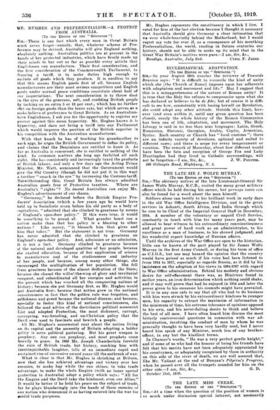THE LATE SIR J. WOLFE MURRAY.
[To THE EDITOR OF THE " SPECTATOR."] SIR,—The obituary notices of the late Lieutenant-General Sir James Wolfe Murray, K.C.B., recited the many great military offices which he held during his career, but pertnips room can also be found for a word about the man himself.
Soldiers alone can testify to his brilliant work in early days in the old War Office Intelligence Division, and to the great services in Ashanti, South Africa, and India through which he rose to be Chief of the Imperial General Staff in December, 1914. A member of the voluntary or unpaid Civil Service, constantly in touch with him for many years past, may be allowed to bear witness to his extraordinary conscientiousness and great power of hard work as an administrator, to his excellence as a man of business, to his shrewd judgment, and his wonderful expert knowledge of Russian affairs.
Until the archives of the War Office are open to the historian, little can be known of the part played by Sir James Wolfe Murray in the first Army Council, or during his term of office as C.I.G.S., but one may hazard the opinion that the country would have gained as much if his voice had been listened to from 1914 to 1917, especially as regards Russia, as it did by his insistence on the adoption of his views in 1904-1907 with regard to War Office administration. Behind his modesty and obvious desire for self-effacement there was, as Ministers found in earlier years, an iron determination which nothing could shake, and it may well prove-thathad he enjoyed in 1914 and later the power given to his successor his counsels might have prevailed.
It is in any case safe to say that all who had to do business with him were struck by his extraordinary kindness to younger men, his capacity to extract the maximum of information in the minimum of time, his extreme tolerance of opinions opposed to his own, and his never-failing desire to think and believe the best of all men. I have often heard him discuss the most bitterly controversial questions in connexion with war administration, involving the conduct of men by whom he was generally thought to have been very hardly used, but I never heard him speak of any Minister, much less of any brotherofficer, in any but the kindliest terms.
In Chaucer's words, " He was a very perfect gentle knight," and if some of us who had the honour of being his friends have felt that his merits have not been adequately appreciated by his countrymen, or adequately recognized by those in authority on this side of the river of death, we are well assured that, like Mr. Valiant at the end of Bunyan's Pilgrim's Progress, when he passed over all the trumpets sounded for him on the other side.—I am, Sir, &c., G. D. October 21st, 1919.










































 Previous page
Previous page